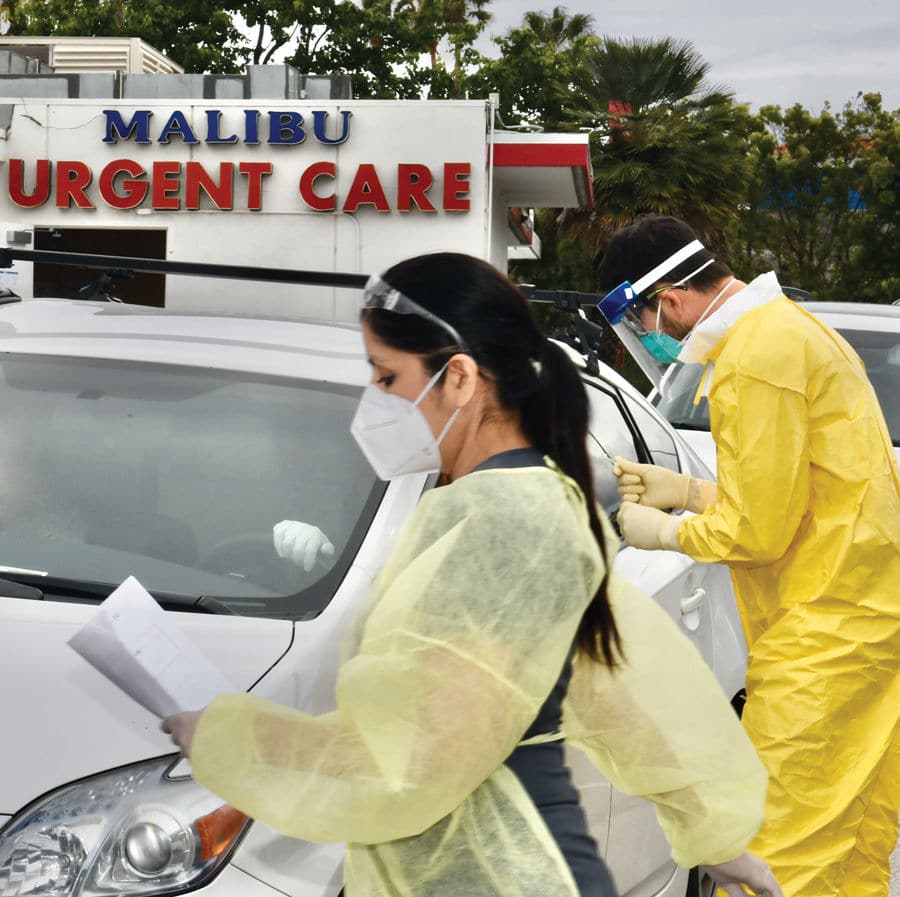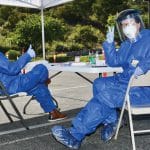
For many weeks after the start of the novel coronavirus emergency, Malibu residents with symptoms had to be sent miles away for testing. None of the medical offices in town could get the tests, which were in short supply. That changed last week when a couple of local nonprofit organizations used their clout to bring tests to Malibu and conduct hundreds of COVID-19 drive-through tests.
The nonprofit Community Organized Relief Effort (CORE) founded by actor Sean Penn operated a COVID-19 test site at City Hall all last week, in cooperation with the Malibu Medical Group and COVID Clinic group, offering testing to first responders and then to residents.
In addition, the nonprofit Malibu Foundation, which recently formed a COVID-19 Rapid Response unit, worked with Malibu Urgent Care to conduct two days of drive-through testing for at-risk Malibu residents last week.
“We’d been trying to get tests up and running, but there’s a shortage of tests around the country,” Dan Katz, MD, and co-owner of Malibu Urgent Care, said. “We had a lot of concern for patients and their relatives, and we didn’t know the extent of the disease.” Even St. John’s, the hospital in Santa Monica that Malibu Urgent Care normally partners with, was not able to get test kits for them.
“I was then approached by Malibu Foundation, who connected me with test kits and a lab that could analyze the tests,” Katz said. “The foundation raised a significant amount of money and donated the tests. Malibu Urgent Care donated the staff and offered free testing for the elderly and those with underlying conditions, conducting a total of 300 drive-through tests over two days.”
“My staff has been absolutely incredible,” Katz said. “They’re really dedicated. The staff members helping me with the drive-through testing came in and worked for free on their days off.”
He acknowledged that some patients tested positive for the coronavirus.
Following the community drive-through test days, Katz confirmed that Malibu Urgent Care continues to test patients for COVID-19 as needed. “But we have to be very prudent with the testing kits we have—we’re trying to allocate them to high-risk groups.”
One way the staff is coping with the pandemic is the initiation of telemedicine, where they and the patients can see and talk to each other using a smart phone, tablet or laptop. “We’re using telemedicine because people don’t really want to come out,” Katz explained. “We do the assessment over the phone, and if the patient is showing COVID-19 symptoms, we have them drive in and swab them in their car. We want to keep them out of the clinic.”
He said it’s hard not having the same kind of personal interaction with patients that was always taken for granted. Normally, he likes to shake hands, but can no longer do that. Plus, “It’s a fact that a lot of human emotion is communicated with facial expressions, and now we can’t see each other’s faces (because we’re both wearing masks).”
Katz said his point was made clear that very day. He was with a patient and had to take his face shield off for a second when it fogged up. The patient said, “My concept of you completely changed when I saw you smile.”
“We’ve kept the doors of Malibu Urgent Care open this entire time,” Katz continued. “We have a very dedicated staff and have remained available to treat all of the usual things people come to urgent care for, although the number of walk-in patients has gone down since the stay-at-home rule went into effect. We’ve made a commitment to Malibu to keep our doors open, no matter what.”
In addition, “the Malibu community has donated masks, food, homemade jams and honey to us—showing an incredible amount of support. It’s touching,” Katz said.
Ardalan (“Ardy”) Haghighat, clinical director of the UCLA Health Community Physician Network, which includes the Malibu’s UCLA Health clinics, said the clinics haven’t had any shortages of personal protective equipment. In addition, he said Malibu UCLA has test kits available for onsite COVID-19 testing, but patients need to be pre-screened first, per Centers for Disease Control and Prevention (CDC) guidelines.
“People do come inside the clinic to get the test, but we can do it outside or at the front door if the doctor feels it’s warranted,” Haghighat said. UCLA Malibu is also trying to use telemedicine as much as possible, because it “protects everyone involved—the staff and the patients. But it’s up to the doctor to decide if a patient can be safely assessed over the phone. We’re ready to serve the community.”
The Malibu Times is working to collect the stories of essential workers—healthcare professionals, first responders, grocery store employees, delivery drivers and anyone in the community working to keep our society afloat during this pandemic. If you or someone you know is on the “front lines” and is interested in speaking to the paper, please send an email to editorial@malibutimes.com. The Malibu Times thanks you on behalf of the entire Malibu community for your courage and dedication. Anonymity will be considered in certain circumstances.

